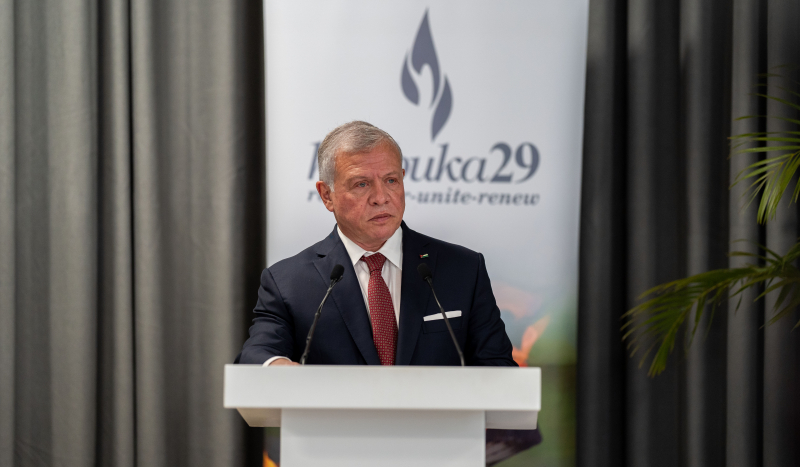King Abdullah reiterated his calls for a permanent halt to the war during his meeting with U.S. Secretary of State Antony Blinken.
Israel’s war on Gaza has created “an entire generation of orphans,” Jordan’s King Abdullah II told the press in Rwanda on Monday, highlighting the alarming killings of Palestinians during the brutal war.
“More children have died in Gaza than in all other conflicts around the world this past year. Of those who have survived, many have lost one or both parents, an entire generation of orphans,” the Jordanian leader said at the Kigali Genocide Memorial.
The Jordanian ruler’s remarks came as Israel continues its genocide in Gaza, where it has killed at least 23,210 Palestinians in Gaza and injured 59,167 others. Women and children make up 70% of the total figure.
More than 25,000 children in the Gaza Strip have lost one or both of their parents during the war, Euro-Med said on December 9.
“How many times have we said never again, only to find ourselves facing another conflict rooted in hatred and dehumanisation? Almost 30,000 Gazans have been killed or unaccounted for over the past three months,” King Abdullah said.
The Jordanian king added that “The world will continue to pay a heavy price for failing to resolve this conflict” in the absence of a two-state solution.”
Jordan has been among the countries vocally supporting a ceasefire in Gaza while taking a hard stance against Israel for its atrocities on the ground.
King Abdullah reiterated his calls for a permanent halt of the war on Sunday during his meeting with U.S. Secretary of State Antony Blinken in Amman, according to a statement by the Royal Hashemite Court.
The U.S. has been opposing a ceasefire in Gaza while calling for a pause for the return of the remaining 136 Israeli and foreign captives.
“His Majesty stressed the important role of the United States in pushing towards an immediate ceasefire in Gaza and the protection of civilians, while guaranteeing the sustainable delivery of sufficient humanitarian and relief aid to the Strip,” the statement added.
Jordan had normalised ties with Israel in 1994 under the Wadi Araba Peace Treaty, which guaranteed the former the restoration of its occupied areas of Al-Baqoura and Al-Ghumar.
Despite sharing ties with Israel, Jordan has taken a harder stance towards Tel Aviv since the beginning of the attacks on Gaza.
On November 1, Jordan officially recalled its ambassador to Israel over the “unprecedented humanitarian catastrophe” in Gaza.
The kingdom said it would only send back its envoy if Israel halted its onslaught and called on Tel Aviv to recall its ambassador to Amman.
Jordan then decided to not sign a water-for-energy deal with Israel on November 17 over the Israeli aggression on the Gaza Strip.
“Can you imagine a Jordanian minister sitting next to an Israeli minister to sign the deal while Israel is killing our people in Gaza?” Jordan’s Foreign Minister Ayman Safadi told Al Jazeera at the time.
Jordan is home to the world’s largest Palestinian diaspora of more than six million, many of whom have Jordanian citizenship, mainly due to the geographic distance between both countries.
Many Palestinians had fled to Jordan after the 1948 Nakba, or “catastrophe”, where Zionist militia forced more than 700,000 Palestinians out of their lands to establish Israel. More Palestinians fled to Jordan during the six-day war of 1967, known as the Naksa or “catastrophe.”
One in five people currently living in Jordan is Palestinian, according to recent data published by the New York Times. More than two million Palestinian refugees are in Jordan.
Jordan’s streets have witnessed almost weekly protests calling for a ceasefire in Gaza since the beginning of the genocide.







